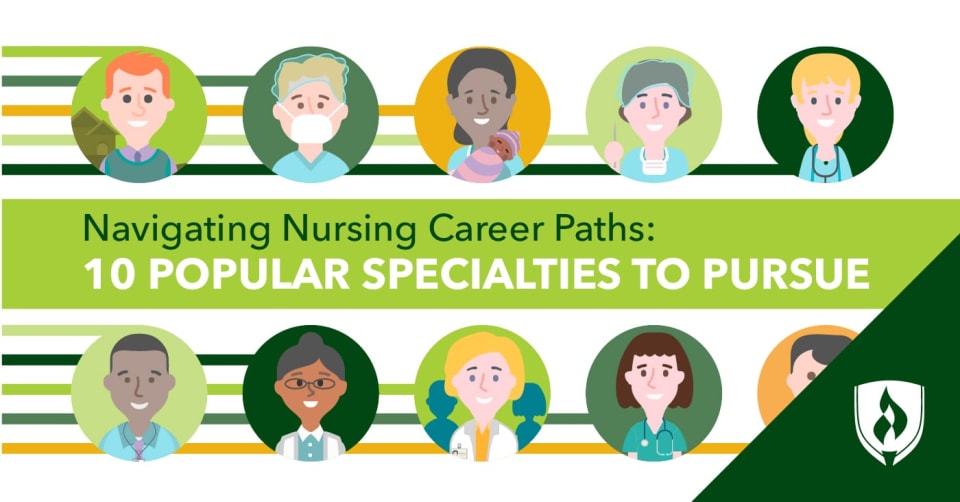
If you choose to become a nurse, one thing is certain: You’ll have a lot of options for how you can focus your nursing career. That’s fantastic news for anyone who values flexibility and variety, but it can also be a little overwhelming as you attempt to narrow down your career path. For each new nursing route, a host of questions crops up: What education will I need? Will I need experience to specialize? How do I get started in these roles? The list goes on.
Join us as we take a look at what a “normal” nursing career path consists of and explore what you’ll need to get started in some of the most popular nursing specialties. Also, check out the pros and cons of an RN to BSN online program.
Get Your Nursing School Questions Answered at a Nursing Information Session
What does a “normal” nursing career path look like?
For many professions, a “normal” career path is relatively simple: Start in a junior-level specialized role, then advance to either a senior specialized role or a management position; from there, it’s a climb to higher-level management positions.
Nursing career paths, however, aren’t quite as tidy. There are several educational levels for nurses, which translates to several entry points into the field. Add to that the fact that many nurses are perfectly happy to spend their careers working in a specific, specialized role, and it becomes clear that there’s really no such thing as a normal nursing career path—normal is what you make it.
Whether your sights are set on a management role or on finding your groove in a specialized care unit, it certainly helps to know the path ahead. That’s why we compiled 10 of the more common nursing specialties to provide you with a sampling of the various different ways you can break into a fulfilling career as a nurse.
10 Common nursing career specialties to consider
Neonatal intensive care unit (NICU) nurse
Number of job postings:116,779
Overview: Neonatal intensive care nurses work with very ill or prematurely born babies. These babies are often in need of immediate critical care due to birth defects or underdevelopment. As you may imagine, this specialization can be simultaneously very rewarding and quite emotionally taxing. No family wants to see their newborn in the NICU, but helping families by fighting for their infants’ full recovery can be incredibly fulfilling work.
Path to specialization: To specialize as a neonatal intensive care nurse, you’ll first need to become a registered nurse by earning either an Associate’s degree in Nursing (ADN) or a Bachelor of Science in Nursing (BSN) and passing the NCLEX-RN exam. From there, you will need to build experience as a registered nurse in a neonatal setting. After earning experience, you may want to try your hand at earning the Critical Care Registered Nurse (CCRN)® Neonatal certification.
| Minimum education requirements by percentage of job postings:1 | |
|---|---|
| ADN: 54 percent | BSN: 45 percent |
| Preferred experience level by percentage of job postings:1 | |
|---|---|
| 0–2 Years | 3–5 Years |
| 88 percent | 12 percent |
Intensive/critical care unit nurse
Number of job postings:2 66,282
Overview: Critical care nurses—also known as intensive care nurses—are devoted to caring for patients whose ailments are life-threatening. In this role, you’ll need to be keenly aware of fluctuations in patient status and able to think on your feet when determining the best course of action. This position typically has a smaller patient load, but because of their serious conditions, you’ll still have your hands full in caring for them.
Path to specialization: To work as a critical care nurse, you will need at least an Associate’s degree in Nursing (ADN); however, some employers may prefer candidates to have a Bachelor of Science in Nursing (BSN). You will also need to pass the NCLEX-RN examination. Experience requirements may vary, but in many cases, you’ll need some general nursing experience in order to be considered. After you’ve built up some experience, you can choose to earn your Critical Care Registered Nurse (CCRN)® Adult certification.
| Minimum education requirements by percentage of job postings:2 | |
|---|---|
| ADN: 74 percent | BSN: 25 percent |
| Preferred experience level by percentage of job postings:2 | ||
|---|---|---|
| 0–2 Years | 3–5 Years | 6+ Years |
| 88 percent | 11 percent | 1 percent |
Nurse manager
Number of job postings:3 10,405
Overview: Nurse managers are tasked with many of the administrative and managerial duties related to overseeing a nursing unit. This leadership position requires an expertise in the unit they’re in charge of, as well as an ability to collaborate with physicians and healthcare facility administrators. This role will require you to lean on years of accumulated experience, but it will also allow you to pass on some of your practical wisdom to up-and-coming nurses.
Path to specialization: As a senior role in nursing, the road to becoming a nurse manager is relatively lengthy. To start, you’ll most likely want to earn a Bachelor of Science in Nursing (BSN) and pass the NCLEX-RN licensure exam. Your next step will be building nursing experience in a specialized area. Some employers may prefer candidates to have a Master of Science in Nursing (MSN) degree as well, but practical experience can act as a counterbalance for those with less formal education. Management roles are typically based on education, experience and ability—you’ll need to prove you’re up to par in all three, so be sure to seek out leadership opportunities and ways to show you are management material.
| Minimum education requirements by percentage of job postings:3 | ||
|---|---|---|
| ADN: 26 percent | BSN: 71 percent | Graduate degree: 3 percent |
| Preferred experience level by percentage of job postings:3 | ||
|---|---|---|
| 0–2 Years | 3–5 Years | 6+ Years |
| 30 percent | 68 percent | 2 percent |
Nurse educator
Number of job postings:4 5,641
Overview: A perfect role for a natural mentor, nurse educators are responsible for educating and training would-be nurses. In addition to the hands-on instruction of students, nurse educators may also conduct research that can help improve nursing standards and the effectiveness of treatment. This position could be done in a classroom setting or in a clinical setting where they train and supervise new nurses and nursing students.
Path to specialization: To become a nurse educator, you’ll need to earn your stripes. You’ll likely want to start out by earning a Bachelor of Science in Nursing degree, passing the NCLEX-RN exam and gaining clinical experience. Many nurse educator positions will require a post-graduate degree like a Master of Science in Nursing or even a Doctorate degree. If you’d like to work as a nurse educator in a clinical setting, the educational requirements may be offset by proven work experience.
| Minimum education requirements by percentage of job postings:4 | ||
|---|---|---|
| ADN: 9 percent | BSN: 26 percent | Graduate degree: 65 percent |
| Preferred experience level by percentage of job postings:4 | ||
|---|---|---|
| 0–2 Years | 3–5 Years | 6+ Years |
| 22 percent | 75 percent | 3 percent |
Case management nurse
Number of job postings:5 36,152
Overview: Case management nurses work with patients who are dealing with long-term chronic illnesses like cancer or multiple sclerosis. As a case manager, you’ll help patients with treatment options and work with insurance providers to verify your patients receive efficient and effective care.
Path to specialization: To become a case management nurse, you’ll need to earn at least an Associate’s degree in Nursing (ADN) and pass the NCLEX-RN exam. After building some nursing experience, you may want to start working toward a Nursing Case Management certification from the American Nurses Credentialing Center.
| Minimum education requirements by percentage of job postings:5 | |
|---|---|
| ADN: 51 percent | BSN: 46 percent |
| Preferred experience level by percentage of job postings:5 | ||
|---|---|---|
| 0–2 Years | 3–5 Years | 6+ Years |
| 55 percent | 43 percent | 2 percent |
Medical-surgical nurse
Number of job postings:6 20,792
Overview: Working as a medical-surgical nurse is a common entry point into the field for new nurses. These nurses work in nearly any healthcare facility, providing direct care to patients—sort of as a nursing jack-of-all-trades. In this role, you’ll care for patients dealing with a variety of ailments—you’ll check them in, administer medications, monitor their vital signs and perform physician-ordered tests, and that’s just a sampling of the work these nurses do every day.
Path to specialization: There are a few paths to working as a medical-surgical nurse, you’ll need to first earn either a Licensed Practical Nursing Diploma, an Associate’s degree in Nursing (ADN) or a Bachelor of Science in Nursing (BSN) as well as pass the NCLEX exam. If you’d like to focus your nursing career in a medical-surgical setting long term, you may want to earn the Certified Medical-Surgical Registered Nurse® credential from the Medical-Surgical Nursing Certification Board.
| Minimum education requirements by percentage of job postings:6 | |
|---|---|
| Nursing Diploma or ADN: 46 percent | BSN: 54 percent |
| Preferred experience level by percentage of job postings:6 | ||
|---|---|---|
| 0–2 Years | 3–5 Years | 6+ Years |
| 82 percent | 17 percent | 1 percent |
Perioperative (OR) nurse
Number of job postings:7 54,887
Overview: Perioperative—also known as operating room (OR)—nurses are responsible for the care of patients before, during and after surgical procedures. In this role, you’ll spend a large portion of your time assisting surgeons during procedures. You’ll need a strong stomach and an ability to think quickly in high-pressure situations, as the procedures you’ll assist with can be a matter of life and death. This sometimes-high-pressure specialization, however, benefits from smaller patient loads and a great deal of variety in your work.
Path to specialization: There are a few paths to working in a perioperative setting. You’ll need to earn either a Licensed Practical Nursing (LPN) Diploma, an Associate’s degree in Nursing (ADN) or a Bachelor of Science in Nursing (BSN) and pass the NCLEX exam. From there, you can begin building experience in emergency or critical care units. You may also want to consider earning the Certified Nurse Operating Room certification.
| Minimum education requirements by percentage of job postings:7 | |
|---|---|
| Nursing Diploma or ADN: 70 percent | BSN: 29 percent |
| Preferred experience level by percentage of job postings:7 | ||
|---|---|---|
| 0–2 Years | 3–5 Years | 6+ Years |
| 88 percent | 11 percent | 1 percent |
Labor & delivery nurse
Number of job postings:8 18,866
Overview: As a labor and delivery nurse, you’ll focus on bringing new lives into the world—and, in turn, changing the lives of their parents. These nurses assist patients during labor and childbirth, keeping a close eye on vital signs for both mother and infant while assisting physicians along the way. You’ll play a special role in patients’ lives, but, as with nearly any nursing job, there can be some emotional moments should complications arise. That being said, if you enjoy the rush of quickly making critical-care decisions, and the joys that come with welcoming a baby to the world, then this may be a perfect specialization for you.
Path to specialization: To become a labor and delivery nurse, you’ll need to first earn either an Associate’s degree in Nursing (ADN) or a Bachelor of Science in Nursing (BSN). After completing your college coursework, you’ll need to pass the NCLEX-RN exam. From there, you’ll want to gain experience in a labor and delivery unit and consider potentially earning a certification. It is worth noting that there are labor and delivery nursing positions available to licensed practical nurses (LPNs) as well, which may be appealing for nurses looking to get started in this field in a shorter amount of time.
| Minimum education requirements by percentage of job postings:8 | |
|---|---|
| Nursing Diploma or ADN: 68 percent | BSN: 31 percent |
| Preferred experience level by percentage of job postings:8 | ||
|---|---|---|
| 0–2 Years | 3–5 Years | 6+ Years |
| 79 percent | 20 percent | 1 percent |
Emergency nurse
Number of job postings:9 40,178
Overview: As an emergency nurse, you’ll spend your time caring for patients in dire need of immediate care. The work can be intense—you never know when some unexpected disaster could result in an overflowing emergency room—but that’s part of the appeal for many. The patients and ailments you treat in the ER will vary substantially from day to day, which means you’ll have to stay sharp and rely on teamwork to manage it all. It’s also true that many emergency nurses get the opportunity to administer treatments that nurses in other specializations may not—this is because patient situations in the ER can escalate quickly and require immediate attention, so medical personnel must act quickly.
Path to specialization: There are multiple paths to working as an emergency nurse, you’ll need to first earn either a Licensed Practical Nursing Diploma, an Associate’s degree in Nursing (ADN) or a Bachelor of Science in Nursing (BSN) as well as pass the NCLEX exam. Your next step will be to earn experience in an emergency nursing role. After you’ve gained some experience, you may choose to earn an Emergency Nursing certification.
| Minimum education requirements by percentage of job postings:9 | |
|---|---|
| Nursing Diploma or ADN: 72 percent | BSN: 27 percent |
| Preferred experience level by percentage of job postings:9 | ||
|---|---|---|
| 0–2 Years | 3–5 Years | 6+ Years |
| 89 percent | 9 percent | 2 percent |
Home healthcare nurse
Number of job postings:10 34,227
Overview: Home healthcare nurses focus on providing long-term care for patients—typically, the elderly, young children with developmental struggles and those who have limited mobility. This nursing specialization is typically met with a smaller patient load, so you’ll have plenty of opportunity to build strong connections with the patients in your care. You’ll need to be a strong, independent worker in this role, but that independence is often part of the appeal—home healthcare nurses get to avoid some of the hustle and bustle of a busy hospital or clinic.
Path to specialization: To become a home healthcare nurse you have a few options—first, you’ll need to earn either a Licensed Practical Nursing (LPN) Diploma, an Associate’s degree in Nursing (ADN) or a Bachelor of Science in Nursing (BSN). After completing your schooling, you’ll need to pass the NCLEX exam. Depending on employer preference, you may need to build general nursing experience, but many home healthcare nurse positions are available to recent graduates.
| Minimum education requirements by percentage of job postings:10 | |
|---|---|
| Nursing Diploma or ADN: 77 percent | BSN: 21 percent |
| Preferred experience level by percentage of job postings:10 | ||
|---|---|---|
| 0–2 Years | 3–5 Years | 6+ Years |
| 84 percent | 15 percent | 1 percent |
Are you ready to take the first step on your nursing career path?
As varied as the more-than 100 nursing specialization options are, there is one constant no matter the path you choose to take in your nursing career: You’ll need a foundational education in nursing practice. This overview of common nursing career paths should give you a better idea of what level of nursing education to pursue as your journey toward your healthcare career.
But if you’re still unsure of which path to take, don’t worry! We’ve created a helpful resource that can walk you through some of the major questions and considerations you’ll need to weigh before getting started. Check out our infographic, “ Types of Nursing Degrees: Diagnosing Your Ideal Healthcare Career".
Related Articles:




